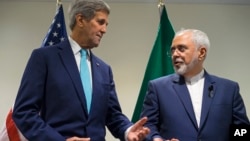The United States sees a "major opportunity" in diplomatic talks at the United Nations to end the bloodshed in Syria and Yemen and to make progress toward achieving peace there.
Secretary of State John Kerry gave that optimistic assessment following his talks in New York Saturday with Iran's foreign minister, Mohammad Javad Zarif, ahead of the opening of the annual U.N. General Assembly debate on Monday.
"I view this week as a major opportunity for any number of countries to play an important role in trying to resolve some of the very difficult issues [in] the Middle East," Kerry said. "We need to achieve peace and a way forward in Syria, in Yemen ... [and throughout] the region itself."
Hope for progress
Kerry said he believes there are chances "to make some progress" in the coming days, during talks on the sidelines of the U.N. meetings.
Zarif said he plans to focus on full implementation of the nuclear agreement between Iran and the major world powers including the United States.
"We hope that by its full implementation — its good-faith implementation — we can [end] some of the mistrust that has existed over many decades," Zarif said. "So that is my priority. But the situation in the region, the unfortunate developments in Saudi Arabia over the last week, have been disastrous and we need to address them... in the proper international forum."
The Iranian official referred to the tragedy in Saudi Arabia this week in which more than 750 people died in a stampede among pilgrims making the Muslim Hajj pilgrimage to Mecca.
Iran nuclear deal
On the nuclear deal, known as the Joint Comprehensive Plan of Action, a senior U.S. diplomat, Wendy Sherman, said "the agreement becomes real" on October 18, known as “Adoption Day,” when Iran is to begin complying with the provisions of the JCPOA.
Under the agreement, Iran will have to reduce its uranium stockpile, remove thousands of centrifuges and make conversions at nuclear facilities. After Iran's compliance is verified by the International Atomic Energy Agency, all sides in the negotiations will mark “Implementation Day,” when the United States and the other powers involved in the past two years of talks will take action to lift international sanctions against Iran.
“I truthfully don’t know how it will all play out,” Sherman said Friday. The undersecretary of state for political affairs predicted, however, that there would be “bumps along the way.”
Syria, a UNGA focal point
Sherman said the crisis in Syria will be a dominant topic at the U.N. General Assembly.
Syrian President Bashar al-Assad receives support from Iran and from Russia, which has been building up its military presence in Syria. That has put both countries at odds with the U.S. and its allies who have urged President Bashar al-Assad to step down to resolve the country’s civil war.
Mike Richman contributed to this report.




